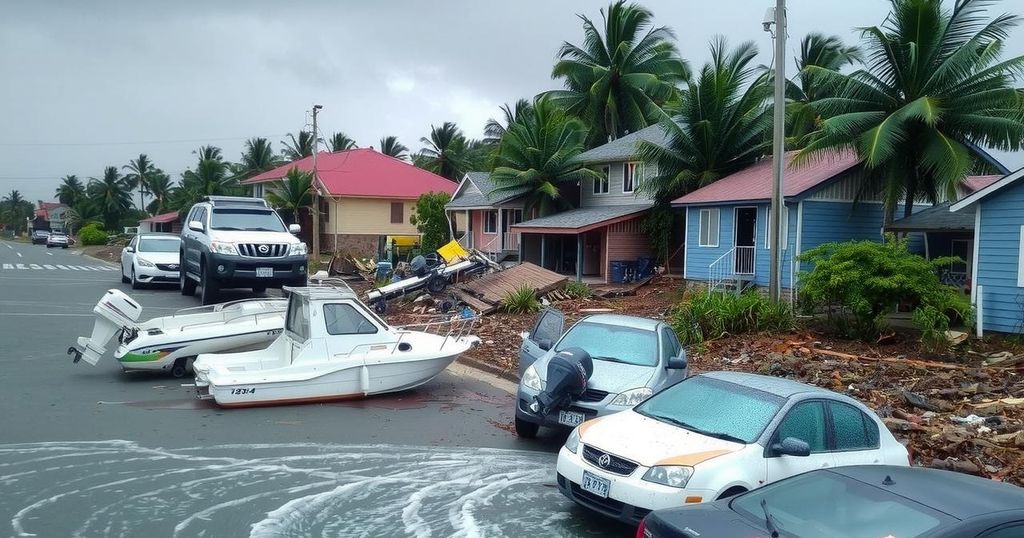Tropical Storm Dikeledi Devastates Mayotte Amid Recovery from Cyclone Chido

Tropical Storm Dikeledi has inflicted severe damage on Mayotte, following its struggles from Cyclone Chido in December. The region faces significant challenges due to inadequate infrastructure and socio-economic vulnerabilities. Emergency protocols are activated as recovery efforts are further complicated by logistical issues. The incidents have sparked concerns about climate change impacts on small island territories, emphasizing the need for a long-term disaster management strategy.
Tropical Storm Dikeledi has caused significant devastation in Mayotte, a French territory in the Indian Ocean, compelling authorities to issue a red alert. Heavy rains and strong winds have disrupted the lives of residents who were already in recovery mode following the catastrophic impacts of Cyclone Chido in December. This earlier storm resulted in the loss of at least 39 lives, left 200 individuals missing, and affected over 5,000 residents. Mayotte, often regarded as France’s poorest department, has faced challenges with its infrastructure, which has been inadequately prepared for such natural disasters.
As the region experienced the brunt of Tropical Storm Dikeledi, officials activated emergency protocols urging residents to secure essential supplies and find refuge in safer locations. The torrential rains and high winds have exacerbated existing struggles, including power outages and property damage from previous storms. Efforts for recovery have been complicated by the logistics required to deliver aid to this geographically isolated archipelago.
The devastation inflicted by these storms has ignited discussions surrounding climate change and its disproportionate effects on small island territories. The increasing frequency and intensity of such weather events are directly linked to rising sea temperatures, and Mayotte’s plight serves as a representation of the urgent need for a robust, long-term disaster management strategy.
In light of Cyclone Chido and Tropical Storm Dikeledi, the socio-economic challenges in Mayotte must also be addressed. High unemployment rates, limited access to healthcare, and inadequate housing further exacerbate the damage dealt by natural calamities. Hence, any rebuilding efforts must factor in both the immediate needs for recovery and the establishment of resilience against future disasters.
Mayotte, an archipelago located in the Indian Ocean, is a French overseas territory characterized by its vulnerability to tropical storms and natural disasters. In December 2024, Cyclone Chido struck the region, marking one of the worst storms in nearly a century and resulting in significant humanitarian impacts. The territory’s socio-economic challenges were further illuminated in the aftermath of Chido, revealing gaps in infrastructure and disaster readiness. Tropical Storm Dikeledi, following closely after, has compounded these challenges, underscoring the urgent requirement for long-term recovery strategies and enhanced climate resilience.
The series of storms, Cyclone Chido and Tropical Storm Dikeledi, has severely impacted Mayotte, highlighting the territory’s vulnerabilities. The combination of human suffering, logistical challenges in aid delivery, and socio-economic factors demands immediate and sustained attention. Strengthened disaster preparedness, international support, and climate resilience initiatives are critical for Mayotte’s recovery. Moving forward, a collective effort among local authorities, international partners, and the community will be essential to ensure a sustainable future for the archipelago.
Original Source: www.travelandtourworld.com








